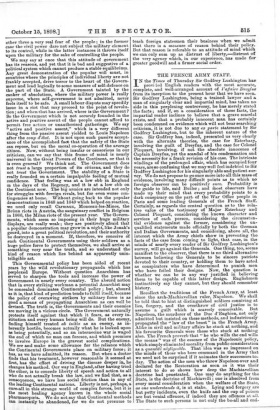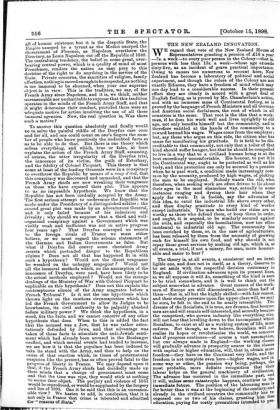THE FRENCH ARMY STAFF.
IN the Times of Thursday Sir Godfrey Lushington has provi led English readers with the most accurate, complete, and well-arranged account of l'ajaire _Dreyfus from its inception to the present hour that we have seen. Sir Godfrey Lushington, being a trained lawyer and a man of singularly clear and impartial mind, has taken no side in this perplexing controversy, he has merely stated the facts ; and if, on a consideration of those facts, the impartial reader inclines to believe that a grave scandal exists, and that a probably innocent man has certainly been condemned on evidence which will not bear searching criticism, it is not due to any ex parte statement by Sir Godfrey Lushington, but to the inherent nature of the case. Sir Godfrey has, indeed, presented us very clearly with the alternate theories, the case for Esterhazy, involving the guilt of Dreyfus, and the case for Colonel Picquart, involving, if not the absolute innocence of Captain Dreyfus, yet the scandal of his condemnation and the necessity for a frank revision of his case. The intricate windings of the prolonged affair, which has occupied four years, are so confusing that we may well feel indebted to Sir Godfrey Lushington for his singularly able and patient sur- vey. We do not propose to go once more into all this mass of evidence, involving many difficult points as to which no foreign observer can be positively sure. Probability is the guide to life, said Butler ; and Most observers have made up their mind that every probability points to dark conspiracy on the part. of the War Office people in Paris and some leading Generals of the French Staff. Certainly, as regards the central question as to the rela- tive value of the testimony of Major Esterhazy and Colonel Picquart, considering the known character and services of each person, considering the circumstan- tial evidence against the former, considering the un- qualified statements made officially by both the German and Italian Governments, and considering, above all, the interest which the Army chiefs show in preventing the facts of the case from coming to light, that case, in the minds of nearly every reader of Sir Godfrey Lushington's survey, will go against the Generals. One thing, too, seems manifest to the observer, that there is no third alternative between believing the Generals to be sincere patriots devoted to their country, or holding them to have acted as conspirators who have determined to punish men who have foiled their designs. Now, the question is whether we can be in any way justified in believing them to be capable of this latter design. Englishmen instinctively say they cannot, but they should remember history.
Recollect the traditions of the French Army, at least since the arch-Machiavellian ruler, Napoleon. We shall be told that to hint at distinguished soldiers conniving at lies, forgery, and the overthrow of civil justice is to assume a guilt which is scarcely conceivable. But Napoleon, the murderer of the Due d'Enghien, not only admitted but insisted on these methods, and industriously propagated the "law of the beast" in the French Army. Alike in civil and military affairs he stuck at nothing, and his favourite Generals were those who stuck at nothing also. The French proverb that " he who wills the end wills the means" was of the essence of the Napoleonic policy, which simply eliminated morality from public consideration as a quantite nIgligeable. That idea was so impressed on the minds of those who bore command in the Army that we need not be surprised if it animates their successors to- day. The action of the men who threw Napoleon over and declared for the Restoration as soon as it was their interest to do so shows how deep the Machiavellian doctrine had penetrated. One may do anything for the State, is the doctrine of Machiavelli ; one is absolved from every moral consideration when the welfare of the State, as one understands it, is at stake. Lying and forgery are but petty incidents, even the knife and the cup of poison are but venial offences, if indeed they are offences at all. The State to such persons is not only the be-all and end- all of human existence, but it is the despotic State, the Empire usurped by a tyrant as the Medici usurped the Government of Florence, as Napoleon overthrew the Directory, as Louis Napoleon cut off the Republic of 1818. The centralising tendency, the belief in some great, over- bearing central power, which is a quality of mind of most Frenchmen, renders the nation an easy prey to this doctrine of the right to do anything in the service of the State. Private concerns, the sanctities of religion, family affection, nothing is sacred enough to be respected, as nothing is too immoral to be shunned, when your one supreme object is in view. This is the tradition, we say, of the French Army since Napoleon, and it is, we think, neither unreasonable nor uncharitable to suppose that this tradition operates in the minds of the French Army Staff, and that it might determine their conduct, provided there were an adequate motive for action involving the use of all these immoral agencies. Now, the real question is, Was there suck a motive ?
To answer this question absolutely and finally would tie to solve the painful riddle of the Dreyfus case once and for all, and one could count on one's fingers the num- ber of people who know positively the undoubted facts so as to be able to do that. But there is one theory which solves everything, and which, true or false, at least explains the action of the French Army Staff, assuming, cf course, the utter irregularity of the Dreyfus trial, the innocence of its victim, the guilt of Esterhazy, and the fidelity of Colonel Picquart. This theory is that some at least of the leading Generals were in a conspiracy to overthrow the Republic by means of a coup d'otat, that this conspiracy was discovered and unmasked, and that the French Army chiefs are now wreaking their vengeance un those who have exposed their plot. This appears 'to us no impossible hypothesis. We know that the Republic has not been cordially accepted by the Army. The first serious attempt to undermine the Republic was made under the Presidency of a distinguished soldier ; the second great plot was made by an adventurous General, and it only failed because of his indecision and irivolity ; why should we suppose that a third and well- organised conspiracy against a Government which was visibly weak and inefficient was not in active progress four years ago ? That Dreyfus conveyed no secrets to the foreign rivals of France we must either 'believe, or we must regard the solemn statements of the German and Italian Governments as false. But -what if Dreyfus did convey some cherished Army .secrets which portended danger to the Republican regime ? Does not all that has happened fit in with such a hypothesis ? Would not the direst vengeance be wreaked on the unhappy scapegoat ? Would not all the immoral methods which, on the assumption of the innocence of Dreyfus, were used, have been likely to be the actual methods employed ? Would not the strange dealings of the Ministry of War with Colonel Picquart be explicable on this hypothesis ? Does not this explain the contemptuous silence of the Army magnates before a Trench Tribunal ? Is it not the one hypothesis which throws light on the cautious circumspection which has led the French Government to allow its Judges to be browbeaten, its civil authority to be palpably abashed .before military power ? We think the hypothesis, in a word, fits the facts, and we cannot conceive of any other hypothesis that does. When to this is added the fact that the accused was a Jew, that he was rather osten- tatiously defended by Jews, and that advantage was taken of these facts to stimulate the anti-Jewish senti- xi:tent which had already been aroused in the Boulanger conflict, and which several events had tended to increase, we see how it is that the populace has been induced to -take its stand with the Army, and thus to help on the cause of that reaction which, in times of preternatural suspicion like the present, has so often proved fatal to the progress of liberty in France. We may depend upon it that, if the French Army chiefs had decidedly made up their minds that a change of government must come and that the time was ripe, they would stick at nothing to secure their object. The perjury and violence of 1851 -would be reproduced, or would be supplanted by the forgery and lies of 1898. Can it be said that this is an unreason. able view ? We hasten to add, in conclusion, that it is not only in France that crime is tolerated and admitted for "reasons of $tatc,"







































 Previous page
Previous page